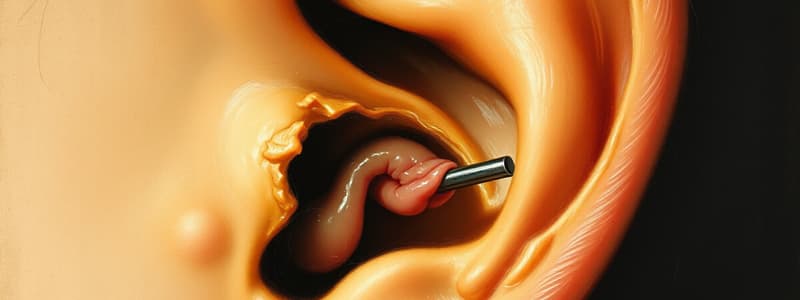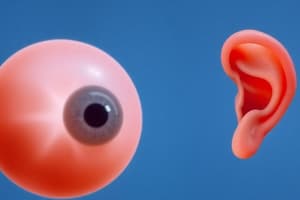Podcast
Questions and Answers
What is the latest development in the treatment of acoustic neuroma?
What is the latest development in the treatment of acoustic neuroma?
- Cyber-knife (correct)
- Gamma knife
- Retro sigmoid approach to CP angle
- External beam Radiotherapy
Which instrument is specifically used in mastoidectomy procedures?
Which instrument is specifically used in mastoidectomy procedures?
- Jansen's self-retaining mastoid retractor
- Myringotome
- Lempert’s endaural retractor
- Mollison's mastoid retractor (correct)
What is the primary purpose of a myringotomy instrument?
What is the primary purpose of a myringotomy instrument?
- Adenoidectomy
- Myringotomy (correct)
- Septoplasty
- Myringoplasty
Which of the following instruments is not used during mastoid surgery?
Which of the following instruments is not used during mastoid surgery?
The MacEwen's curette is used in which type of surgery?
The MacEwen's curette is used in which type of surgery?
Which instrument is designed for performing a tonsillectomy?
Which instrument is designed for performing a tonsillectomy?
What is the purpose of Tilley's antral burr?
What is the purpose of Tilley's antral burr?
In which procedure is irrigation not commonly used?
In which procedure is irrigation not commonly used?
From which structure does the pinna develop?
From which structure does the pinna develop?
What causes a preauricular sinus?
What causes a preauricular sinus?
At what age are surgeries for congenital malformations of the pinna usually performed?
At what age are surgeries for congenital malformations of the pinna usually performed?
The external auditory canal (EAC) develops from which of the following?
The external auditory canal (EAC) develops from which of the following?
What type of anomaly is a collaural fistula considered?
What type of anomaly is a collaural fistula considered?
Which structure develops from all three germ layers?
Which structure develops from all three germ layers?
The Eustachian tube is derived from which structure?
The Eustachian tube is derived from which structure?
Malleus and incus are derived from which arch?
Malleus and incus are derived from which arch?
What is the largest paranasal sinus?
What is the largest paranasal sinus?
Which sinus continues to develop until early adulthood?
Which sinus continues to develop until early adulthood?
What is the occipitomental view with an open mouth called?
What is the occipitomental view with an open mouth called?
Which statement about choanal atresia is false?
Which statement about choanal atresia is false?
What is the most common presentation of bilateral choanal atresia?
What is the most common presentation of bilateral choanal atresia?
Choanal atresia is associated with which of the following conditions?
Choanal atresia is associated with which of the following conditions?
A 2-year-old child presents with a soft, compressible swelling at the root of the nose. What is the most likely diagnosis?
A 2-year-old child presents with a soft, compressible swelling at the root of the nose. What is the most likely diagnosis?
Which statement about nasal glioma is false?
Which statement about nasal glioma is false?
Which condition is not associated with causing saddle nose?
Which condition is not associated with causing saddle nose?
Rhinophyma is characterized by which type of gland hypertrophy?
Rhinophyma is characterized by which type of gland hypertrophy?
Which statement about the condition described is false?
Which statement about the condition described is false?
Rodent ulcer is mainly identified as which type of carcinoma?
Rodent ulcer is mainly identified as which type of carcinoma?
Rhinoscleroma is caused by which organism?
Rhinoscleroma is caused by which organism?
The symptoms of atrophic dry nasal mucosa and extensive crustations indicate which condition?
The symptoms of atrophic dry nasal mucosa and extensive crustations indicate which condition?
Mikulicz cells and Russell bodies are notable findings in which condition?
Mikulicz cells and Russell bodies are notable findings in which condition?
Snuffles are primarily associated with which stage of congenital syphilis?
Snuffles are primarily associated with which stage of congenital syphilis?
Which statement about glomus tumors is false?
Which statement about glomus tumors is false?
What region does the glomus jugulare tumor invade?
What region does the glomus jugulare tumor invade?
What is the earliest symptom of a glomus tumor?
What is the earliest symptom of a glomus tumor?
Pulsatile tinnitus is associated with which condition?
Pulsatile tinnitus is associated with which condition?
Which appearance is characteristic of a glomus tumor?
Which appearance is characteristic of a glomus tumor?
Brown's sign is associated with which condition?
Brown's sign is associated with which condition?
A polypoidal mass in the middle ear that bleeds heavily on touch is likely due to?
A polypoidal mass in the middle ear that bleeds heavily on touch is likely due to?
Which of the following is not included in the rule of 10 regarding glomus tumors?
Which of the following is not included in the rule of 10 regarding glomus tumors?
Flashcards are hidden until you start studying
Study Notes
Embryology of the Ear and Malformations
- Pinna develops from the 1st and 2nd branchial arch.
- Preauricular sinus results from improper fusion of the auricular tubercle.
- Surgeries for congenital malformations of the pinna are typically performed at around 5 or 6 years of age.
- External Auditory Canal (EAC) develops from invagination of the first pharyngeal cleft.
- Collaural fistula is classified as a 1st branchial cleft anomaly.
- Tympanic membrane is the only structure that develops from all three germ layers.
- Eustachian tube originates from the 1st pharyngeal pouch.
- Malleus and incus are derived from the 1st arch.
- Glomus tumors are slow-growing, highly vascular tumors more common in females and typically seen in middle age patients.
- Glomus jugulare tumor can invade the hypotympanum.
- Earliest symptom of glomus tumor is pulsatile tinnitus.
- Pulsatile tinnitus is also associated with Glomus jungulare tumors.
- "Rising sun" appearance is observed in exostosis.
- Brown's sign is characteristic of glomus tumors.
- A polypoidal mass in the middle ear that bleeds easily suggests glomus jugulare tumor.
- Management of a glomus tumor does not typically include preoperative biopsy.
- The "rule of 10" regarding glomus tumors includes 10% familial and 10% malignant transformation, but not 10% multicentric.
- The Phelp sign is used to differentiate Glomus jugulare and tympanicum on CT.
- The most common cerebellopontine angle tumor is treated surgically.
- Latest treatment development for acoustic neuroma includes the Cyber-knife technique.
Instruments Used in Ear Surgery
- Mollison's mastoid retractor is utilized during mastoidectomy.
- Myringotomy is performed using a specific type of instrument designed for it.
- Lempert’s endaural incision is not typically used in mastoid surgery.
- MacEwen's curette is an instrument specific to mastoid surgery.
- Functional endoscopic sinus surgery (FESS) instrument is not used for submucosal resection or biopsy from the nose.
- The Ballenger swivel knife is a commonly used tool in ENT procedures.
Congenital Anomalies of the Nose
- Choanal atresia can be caused by the persistence of the bucconasal membrane; it presents more commonly unilaterally.
- Most common presentation of bilateral choanal atresia is respiratory obstruction.
- Choanal atresia may be associated with colobomas of the eye and heart defects.
- A soft, compressible swelling at the root of the nose in a child is likely a meningoencephalocele.
- Nasal gliomas predominantly present extranasally.
- Saddle nose can occur due to syphilis, leprosy, septal abscess, but not acromegaly.
- Rhinophyma results from hypertrophy of sebaceous glands, commonly seen in conditions like acne rosacea.
- Rodent ulcer refers to basal cell carcinoma.
- Rhinoscleroma is caused by Klebsiella rhinoscleromatis and exhibits characteristic Mikulicz cells and Russell bodies.
- Atrophic rhinitis is indicated by dry nasal mucosa and crustations.
- Snuffles are associated with early congenital syphilis.
Studying That Suits You
Use AI to generate personalized quizzes and flashcards to suit your learning preferences.




